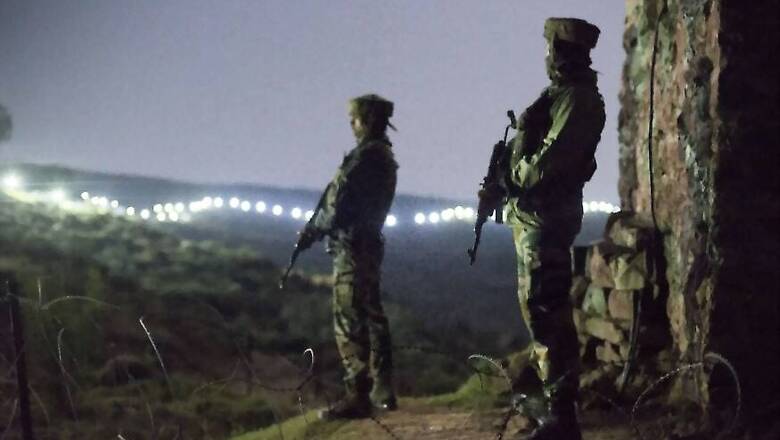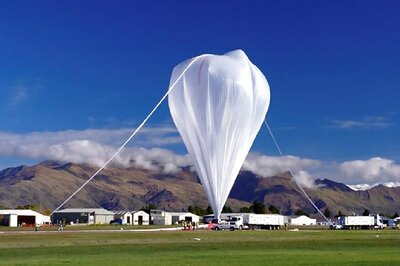
views
In September 2017, speaking at a seminar, Army Chief General Bipin Rawat said that the “supremacy and primacy” of the Army must be maintained. “The Navy and Air Force will play a very major role in support of the Army which will be operating on the ground, because no matter what happens, we may be dominating the area or the air, but finally war will be won when we ensure territorial integrity of the nation,” he explained.
This kicked up a stormy debate that the Army, in seeking primacy, does not understand the transformation in the nature of warfare. There are today five equally important dimensions – land, sea, air, space and cyberwarfare, which will contribute to success in war. The emphasis in future will be on non-contact warfare and the clash between large armies is a thing of the past.
Looking at China, our main strategic competitor, it is argued that the main focus on warfighting must switch to the Indian Ocean, through which flow 80 percent of China’s energy supplies. The Chinese “Malacca Dilemma” must be fully exploited. Along the land borders, the Himalayan barrier precludes large-scale land operations and reliance must be on the air force. In fact, one expert has recently stated that the air force and not the army would lead the land war against China.
None of these arguments are completely incorrect, but in questioning the primacy of land power, they ignore both history and geography, as well as the psychological aspect of warfare. There is no example in military history where a major conflict between strong powers has been decisively won only on the basis of a naval or air campaign.
The Allied strategic bombing campaign against Germany in World War 2 was unprecedented in scale. According to The United States Strategic Bombing Survey, published after the war, almost 2,700,000 tons of bombs were dropped, with more than 1,440,000 bomber sorties and 2,680,000 fighter sorties being flown. An estimated 300,000 civilians were killed and 780,000 wounded while almost 7,500,000 were rendered homeless. However, as the survey pointed out, “The mental reaction of the German people to air attack is significant…Their morale, their belief in ultimate victory or satisfactory compromise, and their confidence in their leaders declined, but they continued to work efficiently as long as the physical means of production remained.” Ultimately it required a ground offensive for Germany to capitulate.
There is a similar trend in the employment of naval power. For Alfred Mahan, the imposition of a blockade to choke a country’s economy was the ultimate manifestation of sea power. However, as John J. Mearsheimer points out in his book The Tragedy of Great Power Politics, “First, blockades alone cannot coerce an enemy into surrendering. The futility of such a strategy is shown by the fact that no belligerent has ever tried it…Second, blockades rarely do much to weaken armies, hence they rarely contribute in important ways to the success of a ground campaign.”
Julian Corbett, a famous British naval strategist, reinforces this view when he writes, “Since men live upon the land and not upon the sea, great issues between nations at war have always been decided…either by what your army can do against your enemy’s territory and national life, or else by the fear of what the fleet makes it possible for your army to do.”
There are two more domains of modern warfare, space and cyber. While important, these are by themselves are not sufficient to force victory. Non-contact warfare is a good term to use, and while countries would like to win victories without much cost, it would be poor strategy to plan our force structure on this assumption.
War is essentially a human endeavour and a clash of wills between two adversaries. Past campaigns have shown that air or sea power has rarely impacted morale of the population to an extent that they force the government to submit. It is only when territories are conquered, and population subjugated that governments surrender. Mearsheimer makes a critical observation, “Armies are of paramount importance in warfare because they are the main military instrument for conquering and controlling land, which is the supreme political objective in a world of territorial states. Naval and air forces are simply not suited for conquering territory.”
Coming specifically to the context of an India-China conflict, let me start by saying that there appears little likelihood of a major conflagration. However, our military planning must cater for this contingency. If this comes to pass, the navy will blockade Malacca Straits. Whether it can do this without affecting the sea traffic to the other East Asian countries like Japan and South Korea is something that the navy would have hopefully worked out.
This blockade would only have an impact if the conflict become protracted and extends to months. The Chinese navy would avoid sailing into the Indian Ocean, except for its submarines, while the Indian navy would not venture into the South China Sea to directly threaten the Chinese mainland.
The Indian air force has an advantage over the Chinese who would take off their aircraft from high altitude airfields. However, the Chinese have numbers on their side and better air-defence equipment. It is not possible to achieve a situation of air superiority in which our air power can cause unacceptable damage. Therefore, any attempt to prioritise the air campaign over land operations would, in my view, be poor strategy.
It is the land campaign across the brutal Himalayan landscape that will decide victory or failure. The capture or loss of territory, soldiers killed, and prisoners captured will impact on national psyche and the minds of military and political leaders. Land power will have primacy in declaring success.
It is also true that the army cannot win this war on its own. Air and naval power will play a hugely significant role and jointness in operations must be encouraged. Equally true is the fact that strengthening of the army cannot come at the cost of the other two services. The army must look to reinvent itself. Its size and structure has left it open to the criticism that it is not suitable for fighting the next war. This criticism is justified and needs to be addressed.
(The author is former Northern Commander, Indian Army, under whose leadership India carried out surgical strikes against Pakistan in 2016. Views are personal.)


















Comments
0 comment